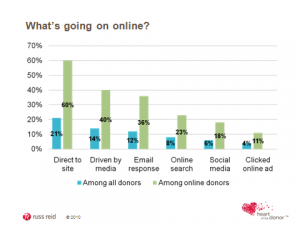An intense debate is brewing across the nonprofit sector right now. Chances are you’ve probably been party to this debate, whether on the pro or con side of the discussion.
At the heart of this debate lies question, what is the appropriate role of social media for nonprofits? Is it an effective fundraising tool, or an expensive distraction?
I think the answer is somewhere in the middle. It is clear to me that there are a lot of snake oil salesmen trying to cash in on this new shiny object that has captured the focus of many nonprofit executives.
Social media is an important part of any nonprofit’s marketing mix. But that’s just it – it is one component. If you look at social media as a replacement for more expensive traditional media vehicles like direct mail, television and radio, you’re doomed to fail.
Likewise, if you completely cast social media aside as a fleeting fad, you risk alienating donors and advocates who want to engage with you in this more intimate way.
As we’re having this very discussion at my office right now, I wanted to see what other practitioners are saying about social media right now. And I was surprised by a lot of what I found.
For example, care2, a fairly progressive online fundraising company just published Social Media Reality Check which discusses the relative audience sizes of each of the major social media platforms. If nothing else, this should be a sobering wake up call to those who preach that social media should replace traditional media vehicles. The bottom line is that social media just doesn’t have the audience volume necessary to be that replacement yet.
In fact, as we talk about social media reality checks, they hit the issue head-on with Myths of Social Media Fundraising over at the blog through nonprofit eyes. This is dated material (from January, 2011), but I can’t tell you how frequently I hear each of these assertions from so-called experts and nonprofit executives (trust me, it’s a lot!).
Additionally, several months ago Network for Good published a study on online giving behavior. There is some great data in this study, including one particularly interesting assessment of charitable giving through social media. Network for Good’s study analyzed giving patterns across 3.6 million transactions and over $300 million in gifts. Interestingly, they found that those who gave via social media gave the least initially, and had the lowest subsequent giving of all groups analyzed. As you prioritize how you’re investing your marketing and fundraising dollars, this is the kind of information I hope will help inform your decisions.
Though dated, another interesting study on this topic comes from Cone, the agency that specializes in cause related marketing. They studied social media’s impact on building awareness and support for causes. And sure enough, they found that social media can positively impact awareness of a given cause.
However, I think more interestingly, their research also found that the awareness bump, if you will, did not readily translate into action in support of the cause.
We’ve even studied this issue at my company, Russ Reid. As part of a broader study on donor behavior, we looked at they way in which donors give online. As you can see from the charts below, our study tends to support the claims made by these other organizations. Social media, while interesting and moderately useful for nonprofits, still delivers relatively little in the way of fundraising value for nonprofits (only 6% of all donors give via social media).
I’d be interested to hear what you think on this topic!


Interesting comment thread on this post over at LinkedIn Groups:
Jeremy Reynalds • Joy Junction uses Facebook quite prolifically and has found it to be very effective. We do not use it to ask for funds, although if we run out of, say, personal hygiene items we find people want to give when we ask for them and water/other beverages to stock our mobile feeding truck.
We let people know what we are doing, how many people we are housing/feeding etc., and have found that an effective use of FB complements other efforts and appears to make participants feel more involved in what we’re doing.
Obviously, effective monitoring is important. We do not allow negative comments or any attacks.
22 hours ago • Reply privately • Flag as inappropriate • Flag as promotion Martha
Martha Ayerdis, MBA • Hi, Andrew, a similar question is in another forum in LinkedIn. My opinion is the same. If an organization can provide donors and volunteers they are using properly the donations the organization is receiving and other resources, I believe the social media can work to help people in need. If it work for political campaign, the same process with accurate information can work 300% for the non-profit sector. Good article!
18 hours ago • Reply privately • Flag as inappropriate • Flag as promotion Andrew Olsen, CFRE • Hi Martha,
Thanks for your feedback and comments! I think Jeremy is on to something in the way that he’s using FB to build community awareness, and for things like GIK requests.
I assume that when you talk about social media working for politics you’re talking about the Obama campaign, right? Interestingly, I think I tend to disagree with your theory that if social media works for politics it would work even better for nonprofits.
First off, what the Obama campaign (the first campaign to make significant use of social media) taught us is that yes, you can effectively use social media to build a large, national awareness campaign. You can use it successfully for voter outreach and GOTV. But when it comes to fundraising, the Obama campaign raised relatively little through social media. The majority of their funds were still raised through traditional channels. Granted, they did raise more than any other campaign in history via social media . . . but it was still a very, very small percentage of their overall revenue.
Secondly, the Obama campaign had several things going for it that nonprofits do not have the benefit of. Namely, they had the benefit of hundreds of millions of dollars in paid and free media. The 24/7 radio, television, print and online media exposure during a national election (especially a Presidential election) has a huge impact. It increases top of mind awareness and further engages people in the campaign (both offline and online). Outside of an organization like Red Cross during a major disaster, I can’t think of a nonprofit on the planet that would get this level of media exposure (or that could afford it if it were available).
And lastly, the Obama campaign also had a huge contingent of volunteers who went door-to-door, attended community meetings, conducted street outreach, etc. These connections further deepened the relationships that people had with the campaign (offline and online),
These components of the campaign all play off of one another to increase voter outreach, fundraising and campaign outcomes. And so social media did “work” for Obama, but it didn’t just work by itself. In fact, had they relied exclusively (or even more significantly – to the detrement of traditional media) on social media, they would not have been nearly as successful.
I agree with you that social media has value for nonprofits. To a degree, it can build community, increase awareness and participation in an organization’s mission, and even generate revenue. However, I think many nonprofits (based on current data), place an inappropriately high value on social media over traditional media channels, simply because it is new and perceived to be free.
17 hours ago • Delete • Flag as promotion Martha
Martha Ayerdis, MBA • No, Andrew I was not talking about Obama’s campaign. I believe it worked for him and his party but for me, the nonprofit sector has to use something different and implement a better channel of communication with the community in which they are providing services. I am part of the campaign of a politic person in Miami, and despite my doubts and fears with the social media fundraising, it is working extraordinary well.
I am a Ph.D student of Public Administration with a major in Non-profit and Leadership. I love the non-profit sector and based on my passion for helping others I had been working hard in order the government (local, state and national) see the non-profit organizations as a partner in the social services field. It has been a hard personal assignment!
The main problem I have detected during my researches is the lack of accuracy or accurate information the donors, volunteers and the community had been receiving from the non-profit organizations. I have been justifing it, explaining the people I have interviewed that sometimes the non-profit organizations cannot provide the right information because the lack of employees in the organization. I believe people do not trust on it.
It is the main point for me (they do not trust) to have a great fundraising department in any non-profit organization. It is important the statistic side of the organization in which they Fundraising department can show the donors and volunteers the effectiviness and efficiency of the program. or example from 100 homeless 70 of them have a job and now they are leaving in a transitional housing. From 50 women victims of domestic violence, 35 of them back to the scholl (studying for their GED, taking computer classes, etc) and they have a part-time job.
I do not have years of experience in Fundraising but I have created some events in which I have raised more money that I expected. I sold them the #s of people who were in the program and now they are living outisde, have a job and the program continue supervising to avoid they relapse.
I am sure if the community see it, they will make a monthly donation!
Thank you for your very well documented comments. Have a blessed Sunday!
9 hours ago • Reply privately • Flag as inappropriate • Flag as promotion Penny
Penny Kievet • Great question………..
We have spent time this year building our friends and followers. Seems that you have to make a difference when it comes to awareness and social impact before you can solicit funds. We are still in the aweness phase of our social media marketing plan. Much like Martha, we have enjoyed the fruits that come from those wanting to volunteer and provide needed items for our guests and students.
I very much appreciated this post. I’m wary of anyone who says anything with confidence about social media fundraising – that anything is black or white. At HelpAttack! we’ve seen every organization, community, and tactic yield wildly different results.
I think the social fundraising community is best compared with automobiles around 1895 – some folks trying steam, some diesel, electric, some still strapping horses on for no apparent reason. Eventually, if you allow me to drag out this metahpor, our cars will fly. But we need to crash a lot of them first.